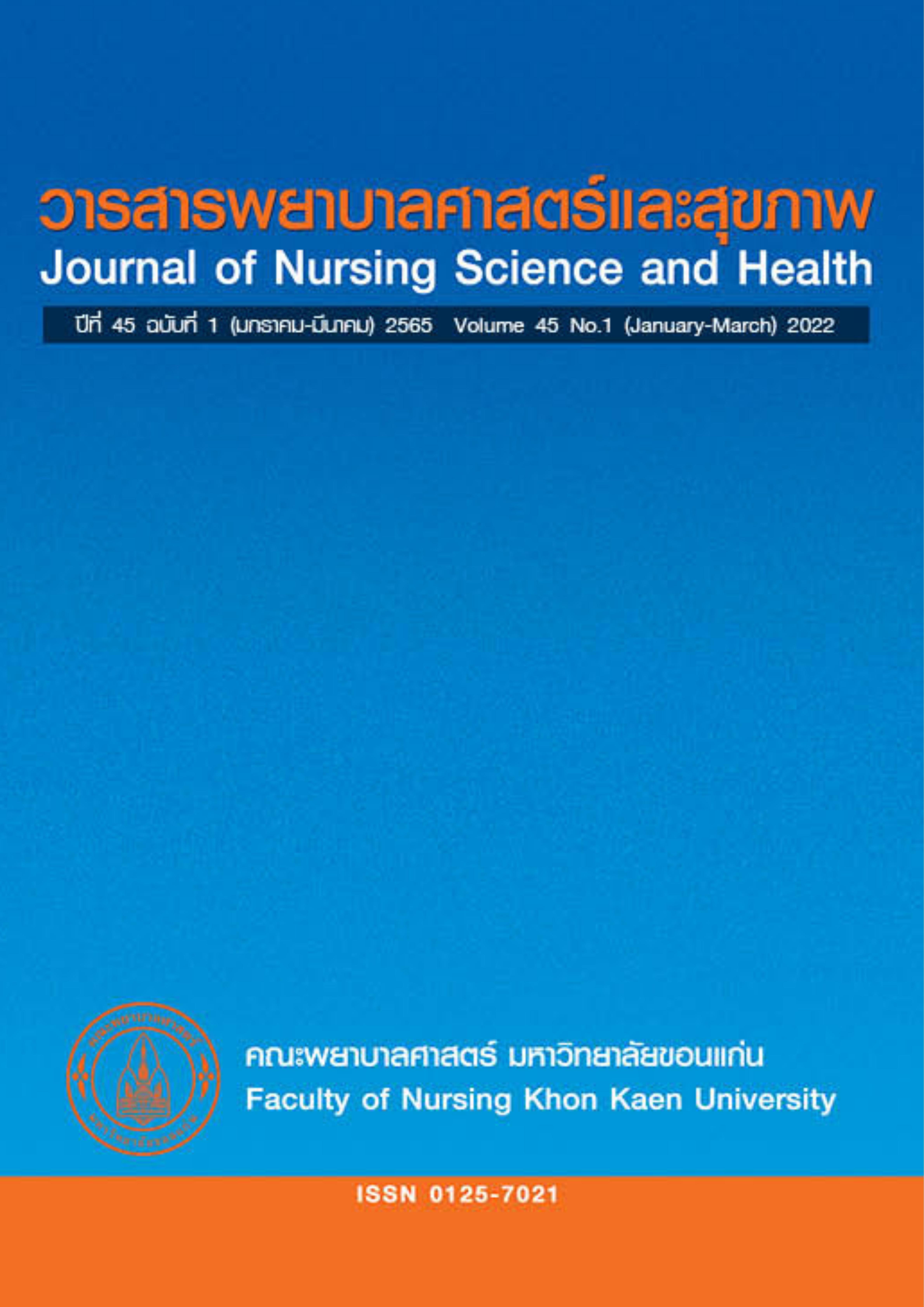ผลของการจัดการเรียนรู้ออนไลน์แบบบูรณาการในช่วงการแพร่ระบาดของโควิด 19 ต่อการรับรู้ตนเองเกี่ยวกับคุณลักษณะภาวะผู้นำและทัศนะต่อวิชาชีพของนักศึกษาในหลักสูตรพยาบาลศาสตรบัณฑิตชั้นปีที่ 1
คำสำคัญ:
โปรแกรมการสอนออนไลน์แบบบูรณาการ , คุณลักษณะผู้นำเชิงวิชาชีพ, นักศึกษาพยาบาล , โควิด 19บทคัดย่อ
การวิจัยกึ่งทดลองแบบกลุ่มเดียววัดก่อนและหลังการทดลองนี้เพื่อศึกษาผลของการจัดการเรียนรู้
รายวิชาศาสตร์ทางการพยาบาลแบบออนไลน์ โดยบูรณาการในช่วงการแพร่ระบาดของโควิด 19 ต่อการรับรู้ตนเอง เกี่ยวกับคุณลักษณะภาวะผู้นำเชิงวิชาชีพและทัศนะต่อวิชาชีพของนักศึกษาพยาบาล กลุ่มตัวอย่างเป็นนักศึกษา ชั้นปีที่ 1 จำนวน 158 คน รวบรวมข้อมูลผ่านระบบออนไลน์ด้วยแบบประเมินตนเองที่ผู้วิจัยพัฒนาขึ้นและผ่านการตรวจสอบคุณภาพได้ค่าความตรง 0.66-1.00 และค่าความเชื่อมั่นที่ 0.82
ผลการศึกษาพบว่า ค่าคะแนน เฉลี่ยการรับรู้ตนเองเกี่ยวกับคุณลักษณะภาวะผู้นำเชิงวิชาชีพภายหลังเรียน (3.85±SD 0.43, n2=119) สูงกว่าก่อนเรียน (3.76±SD 0.33, n1=145) เมื่อเปรียบเทียบความแตกต่างด้วยสถิติ Wilcoxon Signed Ranks Test พบว่า ไม่มีความแตกต่างกันอย่างมีนัยสำคัญทางสถิติ (p-value>0.05) ผลการวิเคราะห์เชิงเนื้อหาของข้อคิด เห็นปลายเปิดเกี่ยวกับการเปลี่ยนแปลงทัศนะต่อวิชาชีพหลังการเรียนพบว่า เกือบทั้งหมด (ร้อยละ 95.80) ระบุว่ามีทัศนะต่อวิชาชีพการพยาบาลเปลี่ยนไปในทางบวก ส่วนใหญ่ (ร้อยละ 77.80) ให้ค่าคะแนนความพึงพอใจมากที่สุดในระดับ 8-10 คะแนน ผลการวิจัยนี้ชี้ให้เห็นว่า โปรแกรมการสอนที่ออกแบบนี้ให้ผลลัพธ์ที่เป็นบวกต่อคุณลักษณะภาวะผู้นำและทัศนะต่อวิชาชีพ ควรนำโปรแกรมการสอนนี้ไปดัดแปลงทดลองใช้กับวิชาอื่นๆ และผู้เรียนในชั้นปีอื่นๆ ต่อไป
เอกสารอ้างอิง
Odom S, Woodruff T, Shehane MR, Dooley KE, Stein M. A qualitative analysis of how students construct their leadership learning from a high impact leadership. Journal of Leadership Education 2021;20(1):31-44,doi: 10.12806/V20/I1/R3
Manning-Ouellette A, Black KM. Learning leadership: A qualitative study on the differences of student learning in online versus traditional courses in a leadership studies program. Journal of Leadership Education 2017; 16(2): 59-79, doi: 1012806/V16/I2/R4 APR 2017 RESEARCH 59 Lear.
Limprasut P, Tongwichian S. A successful leadership in nursing profession. Thai Journal of Nursing 2015; 64(3): 1-5 (in Thai)
Jongudomkarn D, Lertrat P. The emergence of the first nursing faculty of nursing in Thailand: A step towards professional autonomy. Journal of Nursing Science & Health 2014; 37(2): 57-70. (in Thai)
World Health Organization (WHO). Key messages and actions for COVID-19 prevention and control in schools [Internet]. Geneva: WHO; 2020 [cited 2020 Oct 10]. Available from: https://www.who.int/docs/ default-source/coronaviruse/key-messages-and-actionsforcovid-19-prevention-and-control-inschools-march-2020.pdf?sfvrsn=baf81d52_4&download=true, 2020.
Jongudomkarn D, Srisaeng P, Kittiwanapaisan W, Anusorntheerakul S. Using group work as an effective teaching-learning strategy to enhance nursing students’ creativities and participations in Thai cultural context. IJMRAP 2019; 2(2): 78-85.
Jayasuriya-Illesinghe1 V, Nazeer I, Athauda L, Perera J. Role models and teachers: Medical student perception of teaching-learning methods in clinical settings, a qualitative study from Sri Lanka. BMC Med Educ 2016; 16: 9. doi: 10.1186/s12909-016-0576-6
Somnuek P. The development of teaching and learning innovation by using instructional media for enhancement of learning achievement towards tourism product. Journal of International and Thai Tourism 2015; 11(1):4-17. (in Thai)
Chang CY, Sung HY, Guo JL, Chang BY, Kuo, FR. Effects of spherical video-based virtual reality on nursing students’ learning performance in childbirth education training. Interactive Learn Environ 2019; 27: 1–17. doi: 10.1080/10494820.2019.1661854
Parahoo K. Nursing research: Principles, process and issues. London: Palgrave Macmillan; 2014.
Singhanetr S, Jaisit J, Henkeaw W. Nursing leadership in the 21st century. Naresuan Phayao J 2017;10(1):17-22. (in Thai)
Leadership development test one. The foundation of nursing leadership, Hulme Mancheste, UK: The Foundation of Nursing Leadership Office; 2020 [cited 2020 Sep 10]. Available from: http://www.nursing leadership.org.uk
Mazzolini M, Maddison S. When to jump in: The role of the instructor in online discussion forums. Computers & Education 2007; 49:193–213.
Nandi D, Hamilton M, Harland J. Evaluating the quality of interaction in asynchronous discussion forums in fully online courses. Distance Education. 2012; 33(1):5–30.
Simonson M, Smaldino S, Albright M, Zvacek S. Teaching and learning at a distance: Foundations of distance education. 6th ed. Charlotte, North Carolina: IAP; 2015.
ดาวน์โหลด
เผยแพร่แล้ว
รูปแบบการอ้างอิง
ฉบับ
ประเภทบทความ
สัญญาอนุญาต
ลิขสิทธิ์ (c) 2022 วารสารพยาบาลศาสตร์และสุขภาพ

อนุญาตภายใต้เงื่อนไข Creative Commons Attribution-NonCommercial-NoDerivatives 4.0 International License.
วารสารพยาบาลศาสตร์และสุขภาพเป็นเจ้าของลิขสิทธิ์ในการเผยแพร่ผลงานที่ตีพิมพ์ห้ามผู้ใดนำบทความที่ได้รับการตีพิมพ์ในวารสารพยาบาลศาสตร์และสุขภาพไปเผยแพร่ในลักษณะต่าง ๆ ดังนี้ การนำบทความไปเผยแพร่ออนไลน์ การถ่ายเอกสารบทความเพื่อกิจกรรมที่ไม่ใช่การเรียนการสอน การส่งบทความไปตีพิมพ์เผยแพร่ที่อื่น ยกเว้นเสียแต่ได้รับอนุญาตจากวารสารพยาบาลศาสตร์และสุขภาพ



